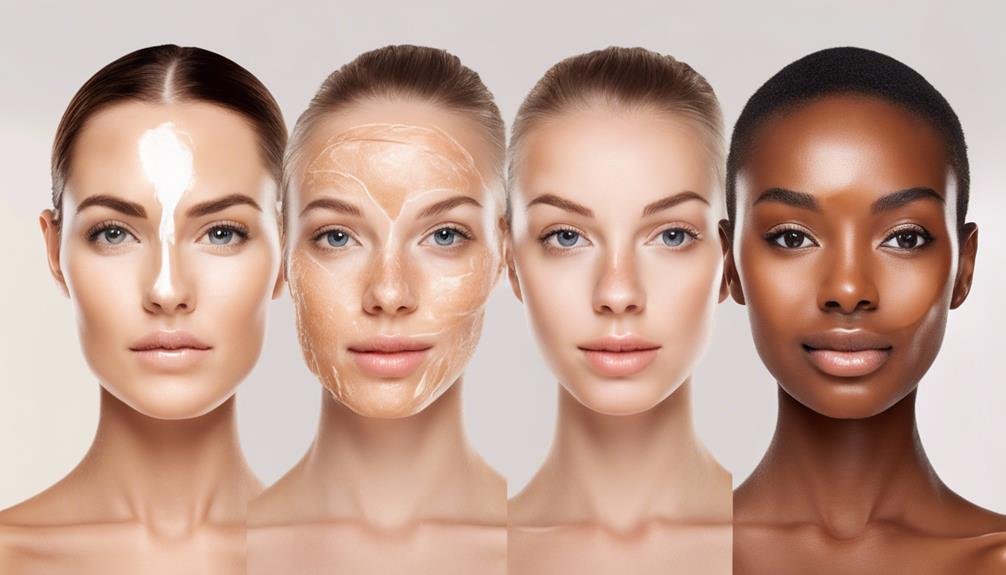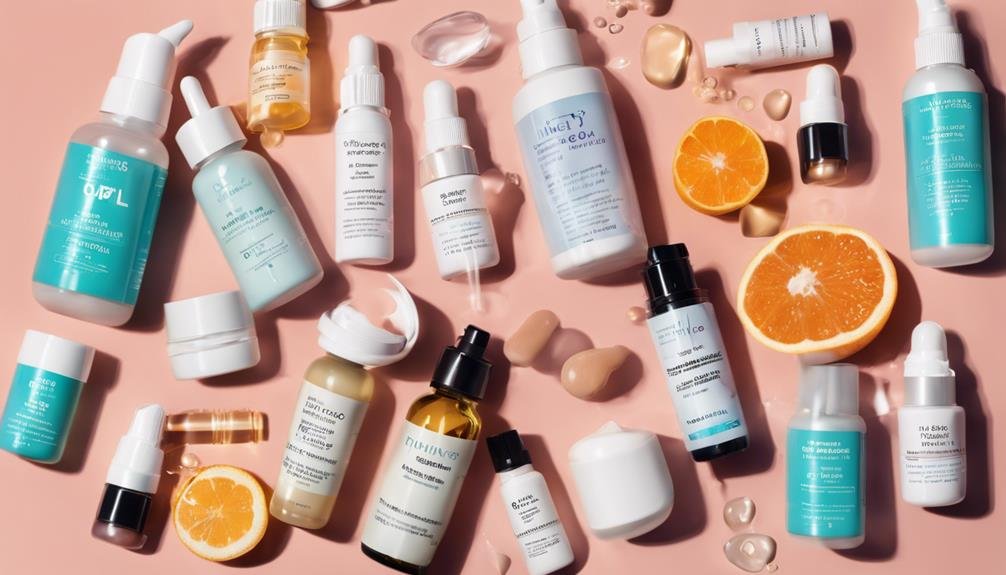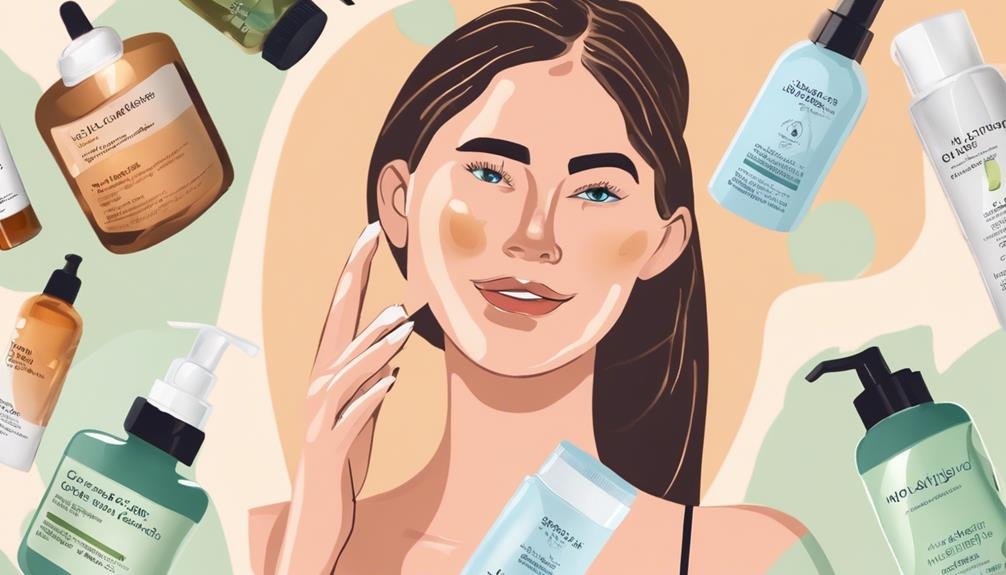"Cherishing Little Steps - A Haven for Baby and Family Journeys"
The Ultimate Guide to Healthy Skin Maintenance
Have you ever wondered if achieving healthy skin is truly attainable with the right knowledge and consistent effort? Understanding your skin type is just the beginning of a journey towards a radiant complexion. From daily cleansing rituals to the importance of sun protection and nutrition, each step plays a vital role in maintaining skin health. But there's more to uncover beyond the basics; professional skincare treatments can offer a transformative boost to your skincare routine. Stay tuned to discover how these expert tips can elevate your path to healthy skin maintenance.
Key Takeaways
- Identify your skin type for tailored skincare.
- Establish a daily cleansing routine suitable for your skin.
- Prioritize hydration and moisturization with key ingredients.
- Always protect your skin with sunscreen and protective clothing.
- Consider professional skincare treatments for specialized care.
Understanding Your Skin Type

To maintain healthy skin, it's crucial to understand your skin type. Knowing whether you have dry, oily, combination, or sensitive skin will help you choose the right products and create an effective skincare routine.
Dry skin tends to feel tight and may appear flaky, requiring rich moisturizers.
Oily skin often looks shiny and is prone to acne, benefiting from oil-free products and regular cleansing.
Combination skin has both dry and oily areas, necessitating a balanced approach with different products for each zone.
Sensitive skin is easily irritated and requires gentle, fragrance-free products to prevent reactions.
Take note of how your skin reacts to different products and environmental factors to determine your skin type accurately.
Understanding your skin type is the first step toward achieving healthy, radiant skin. By tailoring your skincare routine to meet the specific needs of your skin type, you can address concerns effectively and maintain a glowing complexion. Consult with a dermatologist if you have trouble identifying your skin type or need personalized recommendations for your skincare regimen.
Daily Cleansing Routine
Maintaining a daily cleansing routine is essential for healthy skin. Start your day by washing your face with a gentle cleanser suited for your skin type. This helps remove dirt, oil, and impurities accumulated overnight. Remember, over-cleansing can strip your skin of natural oils, so aim to cleanse in the morning and evening.
If you wear makeup, consider double cleansing in the evening to ensure all traces are removed. Pat your face dry with a clean towel, being gentle to avoid irritation. Exfoliate 2-3 times a week to slough off dead skin cells and reveal a fresh complexion. When choosing products, look for ingredients like salicylic acid for oily/acne-prone skin or hyaluronic acid for hydration.
After cleansing, follow up with a toner to rebalance your skin's pH levels. By establishing a consistent cleansing routine, you pave the way for healthier, glowing skin.
Hydration and Moisturization Tips

For optimal skin health, ensuring proper hydration and moisturization is key. Hydrated skin appears plumper, smoother, and more radiant. To maintain skin hydration, drink an adequate amount of water daily, and consider using a humidifier in dry environments.
When it comes to moisturization, choose a product suited to your skin type – whether dry, oily, combination, or sensitive. Look for ingredients like hyaluronic acid, glycerin, and ceramides for effective hydration. Apply moisturizer while your skin is still damp after cleansing to lock in moisture.
For added benefits, incorporate a facial oil or serum into your routine to provide an extra layer of nourishment. Remember to moisturize both in the morning and before bed to keep your skin hydrated around the clock. By prioritizing hydration and moisturization, you can achieve a healthy and glowing complexion.
Importance of Sun Protection
Sun protection is a crucial aspect of maintaining skin health and preventing premature aging. Exposure to the sun's harmful UV rays can lead to skin damage, wrinkles, age spots, and even skin cancer. To protect your skin, it's essential to use sunscreen with a high SPF daily, even on cloudy days. Reapply every two hours, especially if you're sweating or swimming.
Wearing protective clothing, such as hats and sunglasses, can also shield your skin from UV radiation. Seeking shade during peak sun hours, typically between 10 a.m. and 4 p.m., can further reduce your exposure. Remember that UV rays can penetrate through windows, so it's important to apply sunscreen even when indoors.
Nutrition for Healthy Skin

Ensuring your diet is rich in key nutrients is essential for promoting healthy skin. Your skin health is closely tied to the foods you consume.
Antioxidant-rich foods like berries, spinach, and nuts can help protect your skin from damage caused by free radicals. Omega-3 fatty acids found in fish, flaxseeds, and walnuts can help maintain your skin's elasticity and hydration.
Vitamin C, abundant in citrus fruits and bell peppers, aids in collagen production, essential for skin strength. Additionally, zinc from sources like beans, seeds, and dairy can support your skin's natural healing processes.
Remember to stay hydrated by drinking plenty of water, as proper hydration is crucial for maintaining skin elasticity and overall health. By incorporating a variety of nutrient-dense foods into your diet, you can nourish your skin from the inside out, promoting a healthy and radiant complexion.
Managing Stress for Clear Skin
To maintain clear and healthy skin, it's crucial to effectively manage stress levels in your daily life. Stress can wreak havoc on your skin by triggering inflammation, exacerbating conditions like acne, eczema, and psoriasis, and accelerating the aging process. When you're stressed, your body releases cortisol, a hormone that can increase oil production in the skin, leading to breakouts. Additionally, stress weakens the skin's barrier function, making it more susceptible to environmental damage and dehydration.
Implementing stress management techniques such as regular exercise, mindfulness meditation, deep breathing exercises, and engaging in hobbies you enjoy can help reduce stress levels and promote clear skin. Adequate sleep, a balanced diet, and maintaining healthy relationships also play a crucial role in stress management.
Effective Skincare Ingredients

For maintaining optimal skin health, selecting skincare products with effective ingredients is essential. Incorporating the right ingredients into your skincare routine can make a significant difference in the appearance and health of your skin. Here are four key ingredients to look for in your skincare products:
- Hyaluronic Acid: Known for its hydrating properties, hyaluronic acid helps retain moisture in the skin, keeping it plump and supple.
- Vitamin C: A powerful antioxidant, vitamin C helps brighten the skin, reduce hyperpigmentation, and protect against environmental damage.
- Retinol: This derivative of vitamin A is effective in promoting cell turnover, reducing the appearance of fine lines and wrinkles, and improving overall skin texture.
- Niacinamide: Also known as vitamin B3, niacinamide helps strengthen the skin barrier, reduce inflammation, and control oil production, making it suitable for various skin types.
Exfoliation Techniques
To achieve smooth and healthy skin, incorporating proper exfoliation techniques into your skincare routine is crucial. Exfoliation helps remove dead skin cells, unclogs pores, and allows for better absorption of skincare products. There are two main types of exfoliation: physical exfoliation, which involves using scrubs or tools to physically remove dead skin cells, and chemical exfoliation, which uses acids or enzymes to dissolve them.
Here is a table outlining the key differences between physical and chemical exfoliation techniques:
| Exfoliation Type | Method |
|---|---|
| Physical Exfoliation | Scrubs, brushes, loofahs |
| Exfoliating gloves, sponges | |
| Microdermabrasion tools | |
| Chemical Exfoliation | AHAs (e.g., glycolic acid) |
| BHAs (e.g., salicylic acid) | |
| Enzymes (e.g., papain, bromelain) |
When choosing an exfoliation method, consider your skin type and sensitivity. It's essential to exfoliate gently to avoid irritation and over-exfoliation, which can damage the skin barrier. Experiment with different techniques to find what works best for you and enjoy the benefits of smoother, more radiant skin.
Targeting Acne and Breakouts

Addressing acne and breakouts requires a targeted skincare approach tailored to your skin's specific needs. Acne can be frustrating, but with the right strategies, you can effectively manage breakouts and promote clear, healthy skin.
Here are four evidence-based tips to target acne and breakouts:
- Gentle Cleansing: Use a mild cleanser specifically formulated for acne-prone skin. Harsh products can strip the skin of essential oils, leading to increased sebum production and potential breakouts.
- Incorporate Salicylic Acid: Salicylic acid is a beta-hydroxy acid that exfoliates the skin, unclogs pores, and reduces inflammation. Look for products containing this ingredient to help combat acne.
- Spot Treat with Benzoyl Peroxide: Benzoyl peroxide is effective in targeting acne-causing bacteria. Apply a small amount as a spot treatment to affected areas to help reduce inflammation and kill bacteria.
- Hydrate and Protect: Use a non-comedogenic moisturizer to keep the skin hydrated without clogging pores. Additionally, always apply a broad-spectrum sunscreen to protect your skin from sun damage, which can worsen acne scars.
Anti-Aging Strategies
As you prioritize your skincare routine to maintain healthy skin, it's integral to also consider effective anti-aging strategies. Prevention is key in combating signs of aging. Incorporating sunscreen with at least SPF 30 into your daily routine helps shield your skin from harmful UV rays, a major contributor to premature aging.
Additionally, antioxidants like Vitamin C can protect against free radicals that accelerate aging processes. Hydration is crucial, so ensure your skincare regimen includes a moisturizer suitable for your skin type to maintain elasticity and plumpness.
Regularly using retinoids or products containing retinol can aid in reducing fine lines and wrinkles by promoting collagen production. Treatments such as chemical peels or microdermabrasion can help improve skin texture and tone. Remember to pay attention to your neck and hands, as they're often neglected areas that show signs of aging.
Incorporating these anti-aging strategies into your skincare routine can help you maintain a youthful appearance and healthy skin for years to come.
Sleep and Skin Health

Enhancing your skin health through quality sleep is a fundamental aspect of maintaining a glowing complexion and youthful appearance. Adequate rest allows your skin to repair, regenerate, and rejuvenate, contributing to a vibrant and healthy look. Here are four key ways in which sleep impacts your skin:
- Collagen Production: During deep sleep stages, the body produces collagen, a protein crucial for skin elasticity and firmness.
- Reduced Inflammation: Quality sleep reduces levels of inflammatory markers in the body, which can help combat skin conditions like acne and psoriasis.
- Improved Hydration: Proper sleep supports the skin's barrier function, preventing moisture loss and promoting a well-hydrated complexion.
- Dark Circles and Puffiness: Getting enough sleep can reduce under-eye dark circles and puffiness, enhancing your overall appearance.
Prioritizing restful sleep is a simple yet powerful way to support your skin's health and maintain a radiant glow.
Professional Skincare Treatments
For optimal skin health and rejuvenation, considering professional skincare treatments can provide targeted solutions to address specific concerns and enhance your overall complexion. Professional treatments like chemical peels can help exfoliate and improve skin texture, while microdermabrasion can reduce the appearance of fine lines and wrinkles. These treatments are often performed by trained estheticians or dermatologists who can customize the procedure to suit your skin type and concerns.
Another popular professional skincare treatment is laser therapy, which can target issues such as acne scars, pigmentation, and signs of aging. Laser treatments work by stimulating collagen production and promoting skin renewal, resulting in a smoother and more youthful complexion.
Additionally, professional facials are beneficial for deep cleansing, hydration, and relaxation. These treatments often involve steam, extractions, masks, and massage techniques to improve circulation and promote a healthy glow.
When considering professional skincare treatments, it's essential to consult with a qualified skincare professional to determine the best options for your skin needs and goals. Regular maintenance treatments can help you achieve and maintain healthy, radiant skin.
Frequently Asked Questions
How Can I Improve Skin Texture and Tone?
To improve skin texture and tone, exfoliate regularly to remove dead skin cells, use products with ingredients like retinol and vitamin C, stay hydrated, protect from UV rays, and maintain a consistent skincare routine.
What Are the Best Practices for Preventing Maskne?
To prevent maskne, cleanse your face before and after wearing a mask, choose a breathable fabric, avoid makeup under the mask, and use non-comedogenic products. Stay hydrated, follow a gentle skincare routine, and wash reusable masks regularly.
Is It Possible to Over-Moisturize My Skin?
Yes, it's possible to over-moisturize your skin. Too much moisture can lead to clogged pores and breakouts. Find a balance by choosing a lightweight, non-comedogenic moisturizer suitable for your skin type to avoid potential issues.
Can Stress Cause Skin Issues Even With a Good Routine?
Yes, stress can indeed cause skin issues even with a good routine. When stress levels rise, your body releases cortisol, which can lead to increased oil production and inflammation, resulting in breakouts, sensitivity, or other skin problems.
Are Natural Skincare Products Always Better for the Skin?
Natural skincare products are not always better for the skin. While some ingredients can be beneficial, not all natural substances are safe or effective. It's essential to research and understand the components in your skincare products for optimal skin health.
Conclusion
In conclusion, understanding your skin type and implementing a personalized skincare routine is crucial for maintaining healthy skin. Did you know that the skin is the largest organ of the body, covering an average of about 20 square feet? By following daily cleansing, hydration, sun protection, nutrition, and targeted treatments, you can achieve glowing, radiant skin that reflects overall health and well-being. Remember, consistency is key in achieving and maintaining healthy skin!

